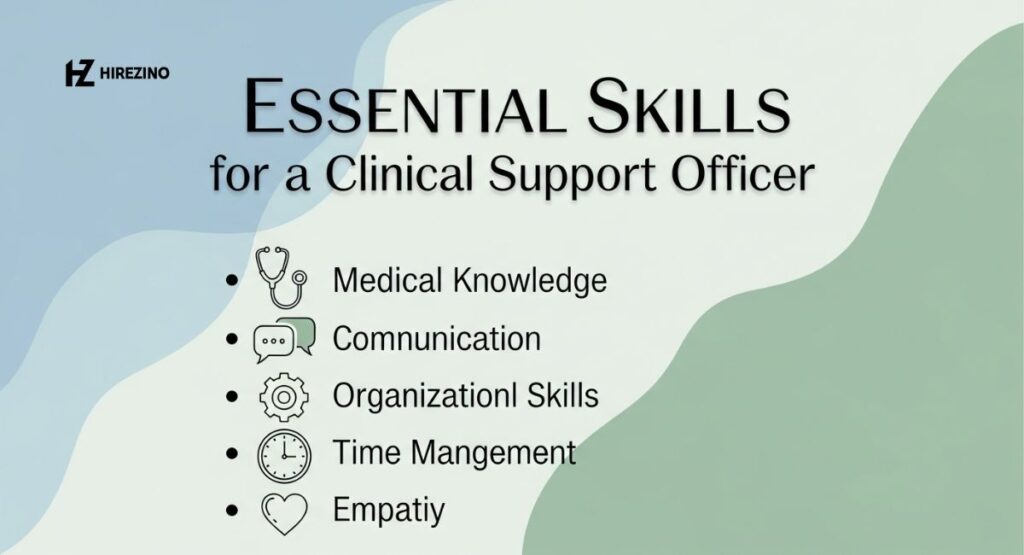Clinical Support Officer is an important formidable contribution to the development of modern healthcare in the United States. A clinical support officer facilitates the normal running of the hospital by coordinating and providing clinical documentation to the doctors, nurses and patients. It is a job that fills the gap between healthcare administration and medical care, which ensures that healthcare support personnel have accurate records, arranges treatments, and provide patients with a humane approach to care. In a system where time is of of essence, the accuracy and dependability of a clinical support officer is the direct determinant of the success of clinical procedures and general quality of the service.
Being a clinical support officer is not an administrative position but a call to make the communication in healthcare stronger and the clinical excellence the main goal of healthcare. You know, hospitals are really leaning hard into this whole digital makeover thing, and with all the buzz around “patient-centered care,” the Clinical Support Officer gig is kinda turning into the unsung hero role. Seriously, these folks do everything from wrangling medical records to bailing out the clinical team when chaos hits. Without them, the entire system would be a hot mess—less efficient, less human, just… less.
What Is a Clinical Support Officer (CSO)?
A clinical support officer is an administrative and operating specialist who works with clinical groups in hospitals or healthcare institutions. Their role is to coordinate activities that lead to effective provision of patient care and clinical documentation. Even the finest registered nurse or medical assistant would not remain organized in the current rapid paced healthcare systems without a clinical support officer.
The clinical support officer provides the interface between the support staff, the doctors, and patients in the United States. They deal with the medical records, aid in scheduling, communications, and Play a role in ensuring the adherence to healthcare policies. Their work improves the quality of care, facilitates ease of teamwork, and promotes the daily operations of all clinical environments.
Key Responsibilities of a Clinical Support Officer
The clinical support officer plays multiple roles and therefore, the job is dynamic and vital. He or she helps the nurses and doctors to prepare documentation, record important information, and carry out administrative support functions that maintain the processes running smoothly. Clinical excellence and patient outcomes are directly influenced by their work.
There are also clinical procedures where the work of a clinical support officer is a necessity: to sort out supplies or update digital records. Agreements with them control the input of data, adherence to confidentiality regulations, and the application of technologies within the healthcare system to automatize activities. The fact that they are so detail oriented enables clinical teams to concentrate on what really counts, which is dealing with patients.
Education and Qualifications Required
A medical degree is not always required to be a clinical support officer, but healthcare training and nursing education programs will be beneficial. In the United States, the minimum qualification required of candidates is high school diploma or GED, then vocational training programs in clinical education or administrative support. Most of the institutions also seek candidates who have work experience as a patient care technician or nursing assistant.
There are regional differences in some state requirements of a license or certification. It can provide a strong advantage to complete a nursing qualification or a short online degree program in health administration. Workers also appreciate those applicants who have collaboration competences, communication competences as well as motivation to enhance quality of care.
Essential Skills for a Clinical Support Officer

A successful clinical support officer blends empathy with efficiency. They must manage tasks precisely while communicating with both patients and professionals. Strong communication skills and collaboration skills make teamwork smoother in any clinical setting.
They should also be able to operate their computers well to generate clinical documentation and update of the medical records. The emotional intelligence and coping with stress are essential, as clinical support officers have to deal with high pressure situations. Patient confidence and professional trust in any healthcare facility are guaranteed by a relaxed, formal manner of functioning.
Average Salary and Benefits
The salaries of an average clinical support officer are based on location, experience, and education in the U.S. His weekly income can be between 950 and 1350 dollars as per general salaries. This number is indicative of such variables as the type of healthcare facility, schedules, and region.
| State | Average Weekly Pay (USD) | Annual Estimate (USD) |
| California | 1,350 | 70,200 |
| Texas | 1,120 | 58,200 |
| Florida | 1,000 | 52,000 |
| New York | 1,380 | 71,800 |
Other than competitive weekly compensation, benefits package usually covers health insurance, retirement plans, tuition reimbursement and paid leaves. This is a satisfying medical career with a stable income as well as career advancement.
Career Path and Progression Opportunities
A clinical support officer can grow into many other healthcare career paths. They could also become a clinical nurse specialist, care coordinator or even become a healthcare provider in management with further professional growth. Others continue their education and obtain a degree in nursing or work in the position of clinical support specialist nurse or travel nursing.
The career is multidimensional, and it has a wide range of career and occupation choices. The future of the healthcare team is achieved by continued education in nursing, as well as attending training courses and seeking mentorship. With time, most of them become supervisors who take care of nursing duties and train new labor support team members.
Typical Work Environment and Schedule
The job setting of a clinical support officer has a large range of variation. The majority works in a hospital setting, outpatient clinic or a medical facility. The work is based on collaboration, working on multiple disciplines, and continuous communication throughout the organization. Interpersonal skills and leadership in nursing are essential in this case.
Clinical support officer can have a day and night shift according to the needs of the facilities. A lot of them admire the work-life balance, which healthcare offers, particularly in environments, which offer flexible working hours or part-time work. CSOs make sure that the operations are smooth, whether in a large clinical environment or a smaller clinic.
Challenges and Rewards of the Role
Man, being a clinical support officer? It’s no walk in the park. You’re juggling patients, emergencies popping off left and right, and if you miss a detail in the paperwork, it could actually matter—like, for real. It takes guts and a thick skin to last in this gig, and if you forget to check in with your own mental health, you’ll burn out before you can even say “shift change.” Nurses and support staff gotta look out for themselves, too. Seriously.
But, honestly? The good stuff totally makes up for the tough days.You witness firsthand how your work efforts which others might overlook create actual improvements for patients. The work may not be glamorous but you stay motivated because you join a team that transforms lives while continuously learning new skills. The combination of life-changing work and continuous skill development makes you want to return to work even after the most unpredictable shifts.Pride, purpose, and a whole lot of caffeine, probably.
How to Become a Clinical Support Officer

The journey to becoming a clinical support officer begins with healthcare training and an interest in helping others.Alright, so if you’re eyeing that Certified Surgical Technologist (CSO) title, here’s how it usually goes down: first, you gotta knock out your basic schooling. After that, you’re jumping into some kind of nursing certification—or maybe you’re the online degree type, or you just wanna take a bunch of admin classes. Whatever floats your boat, honestly. The real magic happens when you get your hands dirty, though—think volunteering at hospitals or clinics to actually see how the sausage gets made in real life.
Once you’ve got the paperwork and experience under your belt, it’s job-hunting time. Most folks send their stuff out to nurse staffing agencies, peek at hospital job boards, or hit up recruiters. Pro tip: if you actually keep an eye on job alerts and aren’t afraid to put yourself out there and network a bit, you’ll land something faster. Oh, and don’t sleep on your resume—make sure it actually shows you’re not a robot, that you can talk to people, play nice in groups, and just generally know what you’re doing. That part’s key.
Related Healthcare Support Roles
Honestly, there’s a bunch of jobs that line up perfectly with the whole clinical support officer gig. Think medical assistant, patient navigator, healthcare support worker—all those folks are the unsung heroes keeping hospitals and clinics from falling apart at the seams. They’re side-by-side with nurses and docs, juggling paperwork, making sure everyone’s on the same page, and just keeping things moving. If you’ve ever seen a hospital run smoothly, you can bet these people are somewhere in the background, making it happen.
And you know what? Being a clinical support officer is kinda like your backstage pass to bigger things in healthcare. Maybe you’ll end up as a clinical support specialist nurse, care coordinator, or even a nursing assistant. Tons of options, tons of room to climb the ladder if you’re into that sort of thing. The main theme? Teamwork, solid communication, and, yeah, actually caring about patients—none of that cold, robot stuff. The more hands-on experience and training you get, the easier it is to jump into more advanced roles, maybe even run the show someday. So if you’re the type who’s all about learning and hustling, there’s basically no limit to where you can go.
Future Outlook and Job Demand for CSOs
Honestly, if you’re eyeing a gig as a clinical support officer in the US, you’re in luck—this field’s basically booming. Hospitals and clinics can’t seem to get enough people, especially with the population getting older (thanks, boomers). Plus, tech keeps shaking things up—think electronic health records, telehealth, all those fancy new platforms nobody’s grandma can figure out. CSOs aren’t just paper-pushers anymore. They’re like the glue holding together medical records, compliance stuff, and making sure things don’t go completely off the rails. Long story short: these folks are becoming the MVPs in healthcare teams, and it doesn’t look like that’s slowing down anytime soon.Reports from U.S. employment data highlight that job growth for clinical support officers will remain steady throughout the next decade, fueled by hospitals’ and clinics’ reliance on efficient administrative and clinical coordination.
Digital healthcare is flipping the script for people in medicine, that’s for sure. If you’re a clinical support officer who actually knows your way around info systems, can spot a data error from a mile away, and doesn’t freeze up when it’s time to talk to someone, you’re basically golden right now—opportunities everywhere. Nursing? Still solid. You get job security, and there’s room to climb the ladder if you want it. People who keep learning and aren’t scared of new tech? They’re the ones making work-life balance actually happen, not just dreaming about it. These days, with all this talk about patient-first care and wild new gadgets, clinical support officers are smack in the middle of pushing healthcare forward in the U.S. Not a bad gig, honestly.
Conclusion
The job of a clinical support officer is that of silent influence and unending influence. They make sure that healthcare mechanisms operate smoothly every day and physicians and nurses concentrate on recovery. Whether it is administration of clinical records or assisting patients, their role is the core of any healthcare facility. The clinical support officer is the unsung hero in the U.S., where hospitals and clinics rely on effective collaboration by matching the people, data, and compassion. Balance between empathetic and organizational skills characterizes the ultimate clinical excellence.
A career as a clinical support officer is a motivating decision to anyone who desires a stable career, a meaningful one, and one that would help them grow. Offering opportunities to advance the career, to develop professionally and to enhance patient outcomes, such a position changes not only healthcare but lives. The future of the healthcare employment lies to the ones who can integrate heart with talent, and there is not much position that represents this perfect combination as the clinical support officer.
FaQs
What is the role of clinical support?
The role of clinical support is to assist doctors, nurses, and other healthcare professionals by managing administrative tasks, patient records, and coordination within healthcare facilities.
What is the role of a CSO in a hospital?
A Clinical Support Officer (CSO) in a hospital ensures smooth operations by organizing patient information, scheduling, and supporting clinical teams to maintain efficient patient care.
What does a clinical support person do?
A clinical support person helps with both administrative and patient-related duties, including maintaining medical records, preparing documentation, and assisting medical staff during daily routines.
Is a clinical support tech a CNA?
No, a clinical support tech is not the same as a Certified Nursing Assistant (CNA); they have different responsibilities, though both support patient care in healthcare settings.
Who gets paid more, CNA or PCT?
Patient Care Technicians (PCTs) generally earn slightly more than CNAs because they perform additional tasks such as drawing blood or performing EKGs.
What position is higher than a CNA?
Positions higher than a CNA include Patient Care Technician (PCT), Licensed Practical Nurse (LPN), and Registered Nurse (RN), all offering more responsibilities and higher pay.

